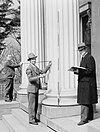File:An elevated view of the...Broad Street bridge...(cropped).tif

Original file (3,771 × 2,581 pixels, file size: 9.28 MB, MIME type: image/tiff)
Captions
Captions
Summary
[edit]| An elevated view of the south face of the Broad Street bridge looking northwest from Civic Center Drive. - Broad Street Bridge, Spanning Scioto River at U.S. Route 40 (Broad Street), Columbus, Franklin County, OH | |||||
|---|---|---|---|---|---|
| Photographer |
Marsh, Fredrik |
||||
| Title |
An elevated view of the south face of the Broad Street bridge looking northwest from Civic Center Drive. - Broad Street Bridge, Spanning Scioto River at U.S. Route 40 (Broad Street), Columbus, Franklin County, OH |
||||
| Depicted place | Ohio; Franklin County; Columbus | ||||
| Date |
1989 date QS:P571,+1989-00-00T00:00:00Z/9 |
||||
| Dimensions | 8 x 10 in. | ||||
| Current location |
Library of Congress Prints and Photographs Division Washington, D.C. 20540 USA http://hdl.loc.gov/loc.pnp/pp.print |
||||
| Accession number |
HAER OHIO,25-COLB,49-5 |
||||
| Credit line |
|
||||
| Notes |
|
||||
| Source | https://www.loc.gov/pictures/item/oh1609.photos.352227p | ||||
| Permission (Reusing this file) |
|
||||
| Other versions | |||||
| Object location | 39° 57′ 40″ N, 82° 59′ 56″ W | View this and other nearby images on: OpenStreetMap |
|---|
File history
Click on a date/time to view the file as it appeared at that time.
| Date/Time | Thumbnail | Dimensions | User | Comment | |
|---|---|---|---|---|---|
| current | 21:04, 10 May 2020 |  | 3,771 × 2,581 (9.28 MB) | Ɱ (talk | contribs) | File:An elevated view of the south face of the Broad Street bridge looking northwest from Civic Center Drive. - Broad Street Bridge, Spanning Scioto River at U.S. Route 40 (Broad HAER OHIO,25-COLB,49-5.tif cropped 25 % horizontally, 36 % vertically using CropTool with precise mode. |
You cannot overwrite this file.
File usage on Commons
The following 3 pages use this file:
- Demolished buildings and structures in Columbus, Ohio
- File:An elevated view of the...Broad Street bridge...(cropped).tif
- File:An elevated view of the south face of the Broad Street bridge looking northwest from Civic Center Drive. - Broad Street Bridge, Spanning Scioto River at U.S. Route 40 (Broad HAER OHIO,25-COLB,49-5.tif
File usage on other wikis
The following other wikis use this file:
Metadata
This file contains additional information such as Exif metadata which may have been added by the digital camera, scanner, or software program used to create or digitize it. If the file has been modified from its original state, some details such as the timestamp may not fully reflect those of the original file. The timestamp is only as accurate as the clock in the camera, and it may be completely wrong.
| Width | 3,771 px |
|---|---|
| Height | 2,581 px |
| Bits per component | 8 |
| Compression scheme | Uncompressed |
| Pixel composition | Black and white (Black is 0) |
| Image data location | 8 |
| Orientation | Normal |
| Number of components | 1 |
| Number of rows per strip | 2,581 |
| Bytes per compressed strip | 9,732,951 |
| Horizontal resolution | 500 dpi |
| Vertical resolution | 500 dpi |
| Data arrangement | chunky format |


